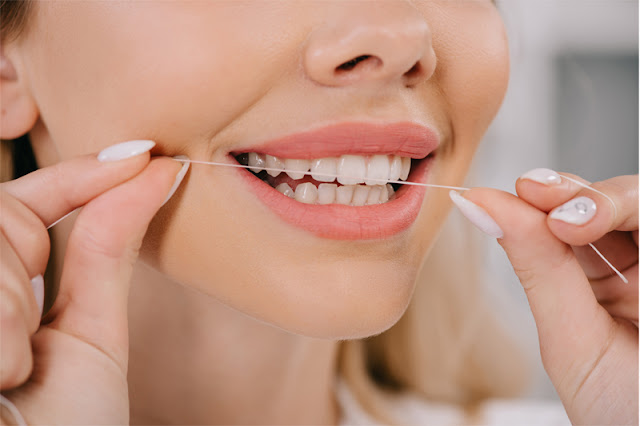Just like your skin, following the teeth-care routine helps in maintaining dental hygiene. Merely brushing isn’t enough to avoid future gum diseases, which might have paved its way in your mouth.
No one like Leftovers - Unless it’s a bacteria
So, don’t let bacterias binge over your leftovers and invite gum diseases along. Floss and crash this future gathering with floss.
Flossing plays a vital role in cleaning all the stuck food chunks from the mouth. It also removes Plaque that might build between your teeth and gumline. According to the American Dental Association (ADA), floss is an interdental cleaner essential in removing Plaque and debris from areas that a toothbrush can’t reach.
What Is Flossing?
Flossing is another way to clean your tooth. A thin cord of filament is used for interdental cleaning. It removes chunks of food and Plaque between teeth, where the toothbrush doesn’t reach. Flossing is recommended by doctors and prevents gum diseases and cavities.
How often should you floss?
Recommended by ADA - You should brush twice a day for about 2 minutes regularly and floss at least once a day. From age 12 on, you should start flossing or use interdental brushes. For a complete dental routine, it’s recommended to floss your teeth before brushing.
Benefits of Flossing
Getting rid of chunks of food stuck between the teeth and making your smile bright again is pretty. Please read about the additional benefits Flossing provides that make it healthy.
Floss and make your smile flawless
• Goodbye to Plaque build-up
The colorless sticky film collected around and between your teeth, even along your gum line, is Plaque. Plaque bacterias releases acids that can damage your enamel, if not removed over time, can cause cavities. Even this plaque build-up can turn tartar that will gather along your gumline and increase the risk of gum diseases.
Flossing removes this sticky film regularly if formed between the teeth and prevents these dental damages.
• Decreases risk of cavities
The tiny holes on the hard outer surface of your teeth, known as enamel, is tooth decay that can further cause cavities. The plaque build-up can damage your enamel; regular Flossing removes Plaque and prevents the damage.
• Reduces risk of gum diseases
The typical symptom of Gingivitis, an early stage of gum disease, is swollen and bleeding gums. Regular Flossing reduces the risk of gum diseases by removing Plaque along the gum line and between the teeth.
• Decreases Bad breath
Keep lousy breath away with Flossing; trapped chunks of food stuck between the teeth when not removed within time can cause a foul smell. Flossing removes those chunks and reduced bad breath.
Floss all the bacterias out! Maintain your oral hygiene with a regular internal dental cleaning.


Comments
Post a Comment